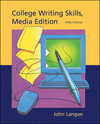 |  College Writing Skills, Media Edition, 5/e John Langan,
Atlantic Community College
Additional Information about Verbs
Key Termsgerunda verbal; the —ing form of the verb used as a noun. Ex.: I love dancing.
helping verbs 1. three common verbs that can either stand alone or be combined with ("help") other verbs: be, have, and do. Ex.: " I was angry" ("was" stands alone); "I was helping Sue" ("was" acts as helping verb).
2. nine verbs (also known as modals or modal auxiliaries) that are always used in combination with other verbs: can, could, may, might, shall, should, will, would, must
infinitivea verbal; to plus the base form of the verb. Ex.: I love to dance.
modal auxiliaries see modals
modalsnine verbs (also known as helping verbs) that are always used in combination with other verbs: can, could, may, might, shall, should, will, would, must
participlea verbal; the —ing or —ed form of the verb used as an adjective. Ex.: I love dancing bears.
verb tensethe time that a verb shows
| Tense | Example | | Present |
I work. | | Past |
I worked. | | Future |
I will work. | | Present perfect |
I have worked. | | Past perfect |
I had worked. | | Future perfect |
I will have worked. | | Present progressive |
I am working. | | Past progressive |
I was working. | | Future progressive |
I will be working. | | Present perfect progressive |
I have been working. | | Past perfect progressive |
I had been working. | | Future perfect progressive |
I will have been working. |
verbals words formed from verbs that often express action: these include infinitives, gerunds, and participles
|
|



 2003 McGraw-Hill Higher Education
2003 McGraw-Hill Higher Education